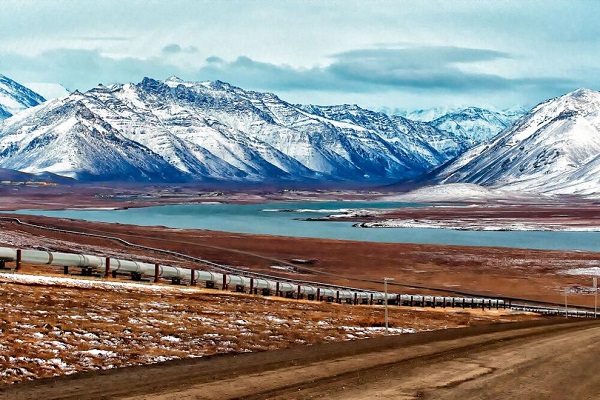Energy
Canada Has All the Elements to be a Winner in Global Energy — Now Let’s Do It

Mike Rose is Chair, President and CEO of Tourmaline Oil Corp.
From EnergyNow.ca
By Mike Rose of Tourmaline Oil Corp.
There has never been a more urgent time to aggressively develop Canada’s massive resource wealth
There has never been a more urgent time to aggressively develop Canada’s massive resource wealth. An increasingly competitive world is organizing into new alliances that are threatening our traditional Western democracies.
Weaker or underperforming countries may be left behind economically and, in some cases, their sovereignty may be compromised. We cannot let either scenario happen to Canada.
Looking inward, our country has posted among the weakest economic growth of all G20 nations over the past decade — we are at real risk of delivering a materially diminished standard of living to our children and subsequent future generations.
Canada is blessed with one of the largest and most diverse natural resource endowments in the world. It’s not just oil and gas; it’s uranium, precious metals, rare earth elements, enormous renewable forests, a vast fertile agricultural land base and, of course, the single-largest freshwater reserve on the planet.
This is nothing new; Canada has been regarded as a resource-extraction economy for a long time, but over the past two decades we’ve been slowing down and finding reasons to not advance new projects. While looking ahead to an exciting new future economy is enticing, the majority of our easily accessible resource wealth remains largely untapped. Our Canadian resource sectors are the most capital-efficient, technologically advanced and environmentally responsible in the world. We’ve got the winning combination.
Canada has among the largest, lowest-cost natural gas reserves in the world — we’re already the fourth-largest producer. With consistent regulatory support, we can rapidly evolve into a leader in the growing global LNG business.
This country produces among the lowest-emission natural gas in the world and technology adaptation is widening the gap. A 10 bcf/day Canadian LNG industry targeted to displace coal-fired electrical generation in Asia would offset the vast majority of emissions from the entire domestic oil and gas industry. Contemplating a cap on the Canadian natural gas industry is actually damaging to the global environment, as growing demand will be met by jurisdictions with higher associated emissions.
As developed economies look at electrification to accelerate emissions reduction, nuclear power is becoming increasingly attractive. Canada is already one of the largest uranium producers in the world and has long possessed one of the most efficient and safest reactor designs. This is an advantage we created for ourselves several decades ago; it’s time to harvest this opportunity.
The rare earth elements required for a growing solar industry and battery requirements associated with electrification are abundant in certain regions in Canada — for example, a large new mining opportunity is emerging in Ontario. We should make that happen. One of the great outcomes of accelerating our multi-sector resource opportunity is that the economic benefits will be enjoyed across the country; all Canadians will share in it.
The Canadian agricultural industry has been long regarded as a world leader in efficiency, yield and technical innovation. Global food security and affordability are rapidly emerging issues, and Canada has a role to play here, as well. Not only could we make it more attractive for Canadian producers to grow output and explore novel new transportation corridors to feed more of the world, we have a large, well-established, globally competitive fertilizer industry.
There are many more future resource wealth opportunities we could be capitalizing on. The list is as long as the imagination of our well-educated and entrepreneurial resource sector workforce.
Enormous amounts of capital are required for these projects, and that global capital is most certainly available. These pools of capital will flow into Canada if we demonstrate a willingness to consistently support the Canadian resource sector at provincial and federal government levels.
Accelerating domestic multi-sector resource development provides solutions to many of the problems currently facing Canada. We’ll be playing to strengths that we have established and evolved over many decades. We are the most efficient and technologically advanced in the full spectrum of resource development. Adoption and innovative adaptation of the continuous march of technology advancements will only make us better.
To paraphrase: We can take advantage of what’s between our ears to do an even better job of developing what’s beneath our feet.
Mike Rose is Chair, President and CEO of Tourmaline Oil Corp.
In an ongoing monthly series presented by the Calgary Herald and Financial Post, Canadian business leaders share their thoughts on the country’s economic challenges and opportunities.
Energy
Houses passes bill to protect domestic oil production, protect Iñupiat community

From T
Indigenous communities are advocating for economic development projects in the North Slope, explaining that more than 95% of their tax base comes from resource development infrastructure.
The U.S. House passed another a bill to advance domestic energy production, this time in response to cries for help from an indigenous community living in the Alaska North Slope.
The bill’s cosponsor, a Democrat from Alaska, did not vote for her own bill. It passed with the support of five Democrats, including two from Texas who are strong supporters of the U.S. oil and natural gas industry.
The U.S. House has advanced several bills and resolutions to support domestic U.S. oil and natural gas production, supported by Texas Democrats. They’ve done so after the Biden administration has taken more than 200 actions against the industry, The Center Square reported.
One includes the Department of the Interior restricting development on over 50% of the Arctic National Wildlife Refuge (ANWR), directly impacting the Iñupiat North Slope community.
The Alaska North Slope region includes a part of ANWR and National Petroleum Reserve-Alaska (NPRA). Both are home to the indigenous Iñupiat community who maintain that the Biden administration is trying to “silence indigenous voices in the Arctic.”
The plan to halt North Slope production was done through a federal agency rule change, a tactic the administration has used to change federal law bypassing Congress. The rule cancels seven oil and gas leases issued by the Trump administration in the name of “climate change.” Interior Secretary Deb Haaland said canceling the leases was “based on the best available science and in recognition of the Indigenous Knowledge of the original stewards of this area, to safeguard our public lands for future generations.”
The indigenous community strongly disagrees, saying they weren’t consulted before, during or after the rule change.
Nagruk Harcharek, president of the Voice of Arctic Iñupiat, a nonprofit that represents a collective elected Iñupiaq leadership, says the administration’s mandate “to ‘protect’ 13 million acres of our ancestral homelands was made without fulfilling legal consultative obligations to our regional tribal governments, without engaging our communities about the decision’s impact, and with an incomplete economic analysis that undercuts North Slope communities.”
He argues the administration has overlooked “the legitimate concerns of elected Indigenous leaders from Alaska’s North Slope. This is a continuation of the onslaught of being blindsided by the federal government about unilateral decisions affecting our homelands.”
Restricting NPR-A oil production is “yet another blow to our right to self-determination in our ancestral homelands, which we have stewarded for over 10,000 years. Not a single organization or elected leader on the North Slope, which fully encompasses the NPR-A, supports this proposed rule,” he said, adding that they asked for it to be rescinded.
In response, U.S. Reps. Mary Sattler Peltola, D-Alaska, and Pete Stauber, R-Minn., introduced HR 6285, “Alaska’s Right to Produce Act.” The U.S. House Committee on Natural Resources Subcommittee on Energy and Natural Resources held a hearing on the issue; members of the Iñupiat Community of the Arctic Slope and the Kaktovik Iñupiat Corporation testified.
Kaktovik Iñupiat Corporation president Charles Lampe said they “refuse to become conservation refugees on our own homelands and unapologetically stand behind the Alaska’s Right to Produce Act.”
The Kaktovik is the only community located in the ANWR. The North Slope Iñupiat have stewarded their ancestral homelands for thousands of years, predating the creation of the U.S. federal government, the Interior Department and the state of Alaska, they argue.
The indigenous communities are advocating for economic development projects in the North Slope, explaining that more than 95% of their tax base comes from resource development infrastructure. Tax revenue funds public school education, health clinics, water and sewage systems, wildlife management and research and other services that otherwise would not exist, they argue. Eliminating their tax base, will directly impact their lives and jeopardize their long-term economic security, they argue.
The House passed Alaska’s Right to Produce Act on Wednesday to reverse the rule change and establish the Coastal Plain oil and gas leasing program. It authorizes and directs federal agencies to administer oil and natural gas leasing on 13 million acres of public land in the North Slope.
The bill passed by a vote of 214-199 without the support of its Democratic cosponsor from Alaska, Peltola, who voted “present.”
Five Democrats voted for it: Sanford D. Bishop, Jr. of Georgia, Henry Cuellar and Vincente Gonzalez of Texas, Jared Golden of Maine and Marie Gluesenkamp Perez of Washington. One Republican voted against it, Rep. Brian Fitzpatrick of Pennsylvania.
After it passed, Harcharek said, “Since the Biden administration announced this decision in September, our voices, which overwhelmingly reject the federal government’s decisions, have been consistently drowned out and ignored. This administration has not followed its well-documented promises to work with Indigenous people when crafting policies affecting their lands and people. We are grateful to Congress for exercising its legislative authority to correct the federal government’s hypocrisy and advance Iñupiaq self-determination in our ancestral homelands.”
Kaktovik Mayor Nathan Gordon, Jr. said the administration “is regulating our homelands in a region they do not understand and without listening to the people who live here.” The new law is “a vital corrective measure that will prevent our community from being isolated and protect our Iñupiaq culture in the long term.”
The bill heads to the Democratic controlled Senate, where it is unlikely to pass.
Alberta
Official statement from Premier Danielle Smith and Energy Minister Brian Jean on the start-up of the Trans Mountain Pipeline

-

 Business2 days ago
Business2 days agoWEF panelist suggests COVID response accustomed people to the idea of CBDCs
-

 Addictions2 days ago
Addictions2 days agoBritish Columbia to re-criminalize hard drug use in public after massive policy failure
-

 Addictions16 hours ago
Addictions16 hours agoCity of Toronto asks Trudeau gov’t to decriminalize hard drugs despite policy’s failure in BC
-

 illegal immigration2 days ago
illegal immigration2 days agoFlight Docs Reveal Which Cities Are Receiving Migrants Under Biden’s Parole Program
-

 Fraser Institute2 days ago
Fraser Institute2 days agoCanada can solve its productivity ‘emergency’—we just need politicians on board
-

 International2 days ago
International2 days agoNYPD storms protest-occupied Columbia building, several arrested
-

 illegal immigration2 days ago
illegal immigration2 days agoOklahoma Just Became The Latest State To Take Immigration Enforcement Into Its Own Hands
-

 Automotive16 hours ago
Automotive16 hours agoVehicle monitoring software could soon use ‘kill switch’ under the guise of ‘safety’








